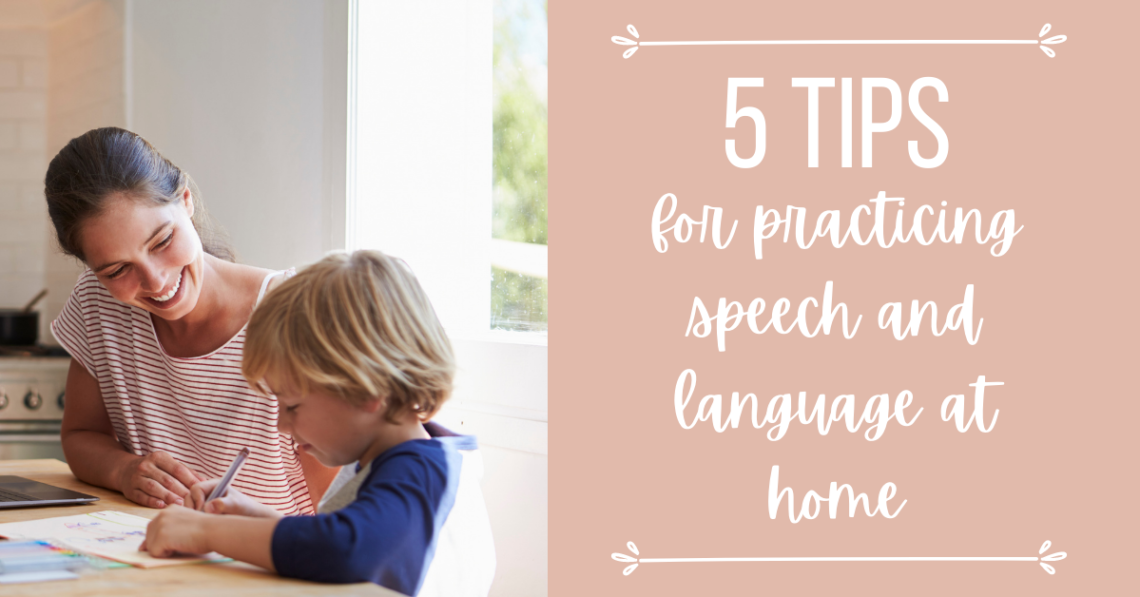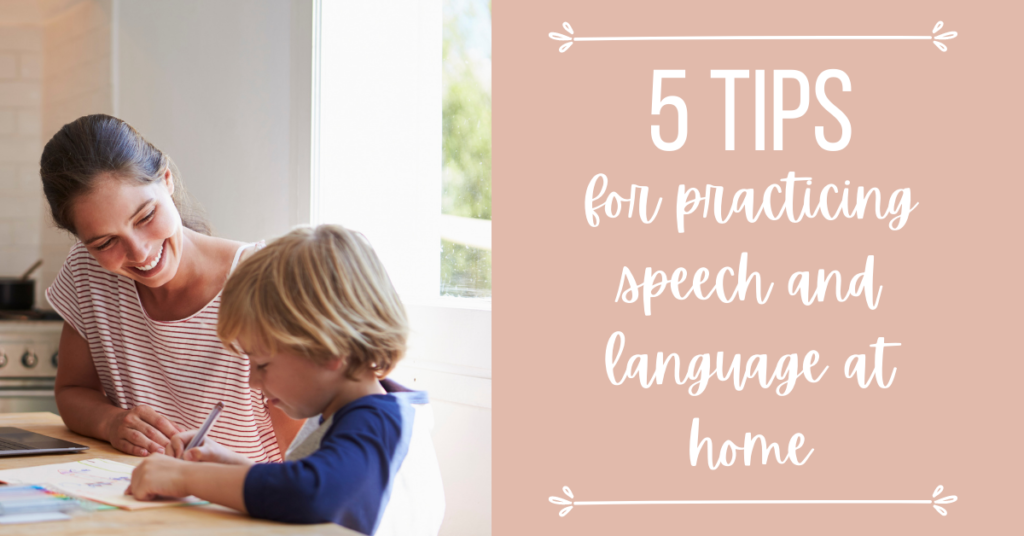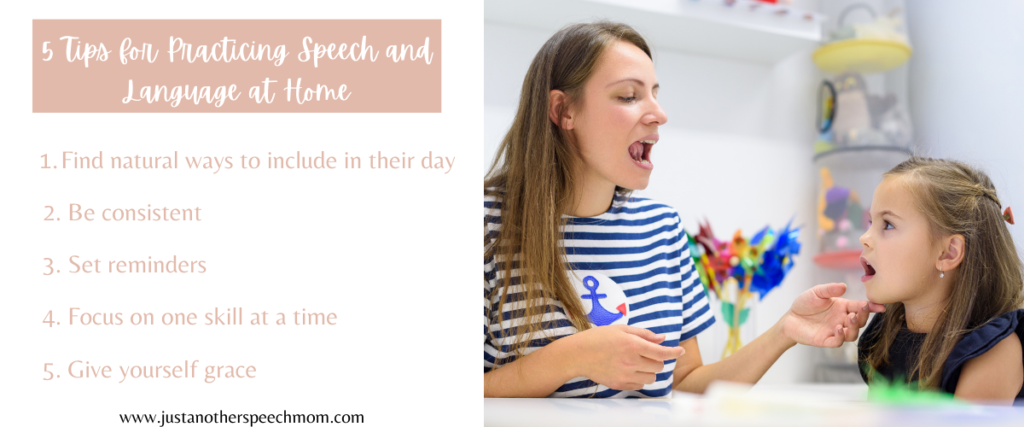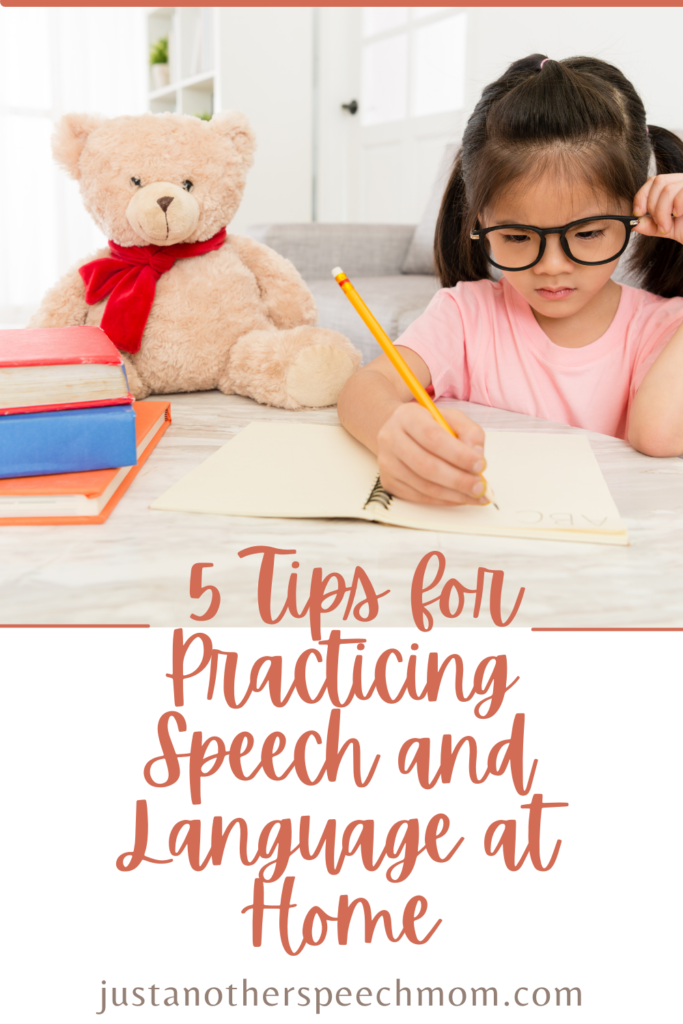
5 Tips for Practicing Speech and Language Therapy at Home

Let’s be real, finding time for practicing can be hard.
Do you have a child in speech or language therapy? If you suspected/were told by your pediatrician that they needed it, there’s probably some relief in knowing that they are now in a place that will allow them to get the extra support they need. We want our kids to be confident communicators! This will look different depending on your child’s needs. Maybe they’re not talking, maybe they are talking but are really hard to understand, or maybe they have difficulty understanding what is being said to them. One thing that parents who are new to the world of therapy may not anticipate is being expected to practice speech and language therapy skills with their child at home.
Now, instead of just sending your child off to speech/language therapy for 30 mn – 1 hour and expecting an easy fix, you as the parent have an extra responsibility. As if you weren’t already worried about your child’s communication (whatever it may look like), you now have to find time during your week to be intentional in using the strategies given to you by your therapist, or completing the homework (or making sure the work gets done).
The main reason why I hear this is challenging from parents isn’t difficult to figure out. We. Are. Busy. Despite your best efforts, it just may not happen that day, or week, or month. You have multiple kids, they all have different homework, practices, activities, etc. On top of that, let’s not forget we are still dealing with a pandemic. Anything extra is hard right now. Then when your SLP checks in to see how practice is going at home, there’s that big wave of shame because it just hasn’t happened.
Speaking as an SLP – this is not how we want to make you feel! Like you, we want your kid to be successful in therapy. In order for them to be successful, it’s important to work together as a team to make sure that your child gets to practice the skills they are working on in other places outside of the therapy room. We want to work together with you to find easy ways to practice goals your child is working on during the day. If what we are suggesting is too hard to implement or isn’t working for your family, let us know!
Speaking as a mom – give yourself grace. Fact: You are busy, things are hard. If you are overwhelmed with how to get practice in at home, I’ll say it again – let your therapist know. Together you all can come up with strategies for practice so that it will not be so stressful.
Isn’t this your job?
So why is it even important to work on carry over of speech and language skills at home? “Isn’t this your job?”
Note: No parent has actually said this to me (but if we’re being honest, at times I’ve felt like it’s implied.) If you are new to the world of speech therapy, you may truly expect to send your child off for their session, and then carry on with the rest of the week until it’s time for speech again.
Yes, it is my job to treat your child with the knowledge and skills I’ve learned and gained throughout my career. But it’s also my job to be an educator to the parent, in order to make sure that your child makes progress everywhere, rather than just at speech.
How to work on speech and language at home without stressing
So what are some easy ways to work on speech and language at home without stressing? This is something I talk about more specifically in other posts (like here), but for now – here are a few basic strategies that I feel like can be applied to many different skills your kid might be working on in speech.

- Find natural/easy ways to incorporate into their day – you can work on speech and language therapy skills during meal times, bath time, after brushing their teeth, during bedtime, in the carpool line, on the way to practice, etc.
- Be consistent – Find a time that works and stick with it! No matter your child’s age, this will help both you and them.
- Set a reminder – like many things in life, you may need a reminder to make this happen and there’s no shame in that. If your child is older – encourage them to set a reminder, alarm, write it down on a post-it, etc. to encourage independence in practicing on their own.
- Focus on one skill at a time – Instead of cramming lots of things into a short amount of time, try just picking one thing to focus on based on suggestions that your therapist has given you (e.g., “while we read this book, I’m going to focus on labeling while pointing to pictures”). This will be less overwhelming (and more successful) for both them and you.
- Give yourself and your kiddo grace – Saying it again because it’s important. Practicing at home doesn’t necessarily mean “we are going to do this until you get it right even if we all end up frustrated.” It means “we are going to work on this a little bit at a time and know it’s okay if we don’t get it right.” You can reward your child for trying and working hard even if the skill is not quite there (“wow you did a great job working on this today – let’s take a break and work on it some more tomorrow.”) Also give yourself grace as the parent. If you are not seeing the progress you’d like at home, don’t blame yourself. Instead, reward yourself for showing up and being intentional with your child – this is already a big deal in itself and is probably making more of an impact than you think.
Wondering if your child needs therapy? Check out my 5 Questions to Ask Yourself freebies for birth – 4 years by signing up for my newsletter.
Happy practicing,






